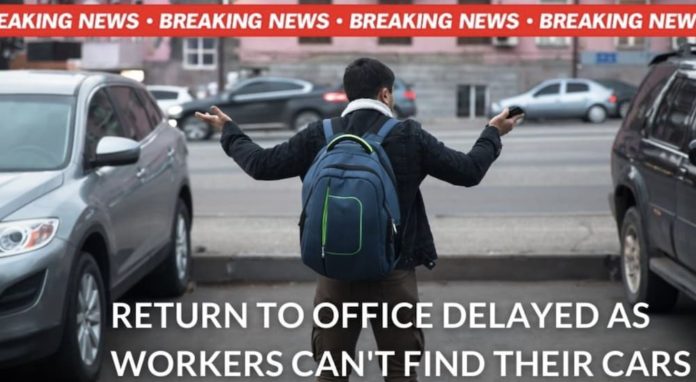Working from home has become the new normal as of late, but as employees are encouraged to head back into the office, some are having a hard time actually getting there. It’s not the accelerated morning routine or rush hour traffic that has workers stymied, but rather, something much more practical: they can’t remember where they parked their cars. This rash of automotive amnesia has already resulted in at least one arrest after a local resident accidentally drove off in her neighbor’s 2023 Chevy Blazer.
“I don’t know what I was thinking. I saw this red SUV and just thought, ‘hmmm, I used to drive a red SUV,’ so I got behind the wheel, and the next thing I know, I’m being read my rights,” said Miranda Spillane, claims specialist and accidental carjacker.
Spillane’s is far from an isolated incident, with law enforcement agencies across the country reporting a dramatic uptick in the number of car thefts, both real and imagined. The incidents seem to be divided into two categories: drivers like Spillane, who accidentally commandeer other driver’s vehicles, and those who, unable to locate the vehicle they last parked 18 months ago, report it missing.
Karl Mann falls into the latter category. The software developer had previously spent as much as three hours a day in his Chevy Malibu, depending on traffic, but had not set eyes on the sedan for almost two years. The vehicle wasn’t sorely missed, with Mann welcoming the opportunity to ditch the commute in favor of his old 10-speed bike, which he used to complete errands around the neighborhood. The new routine became so comfortable that Mann almost forgot his vehicle entirely, leading to some panic when the return-to-work order came in.
“I stopped thinking of my garage as a place to store a vehicle a good 18 months ago––I’ve mostly been using it as a pottery studio––so when I went out there last week to start up the car, and it wasn’t there, I assumed the worst,” he said. Mann reported the theft to police before eventually realizing he had left the Malibu parked at his dad’s house in early 2020.
Even those who have been able to locate their vehicles aren’t having an easy time of it, with the long absence from the road manifesting in all sorts of unexpected and dangerous ways. Some drivers have proven a bit rusty, with basic fender benders and other minor traffic accidents up 17 percent across the board. This is largely attributed to a lack of practice, though some media-binging habits may have also contributed.
“Over the last two years, I’ve watched approximately 23,040 hours of BBC period dramas,” says Stacy Winter, who has worked remotely for much of that time. “I must have been slightly conditioned by all those shows because as soon as I got back on the road, I just couldn’t help but want to use the left lane,” she says. “I also found myself yelling “oi, wanker!” at someone who cut me off, so maybe I need to start mixing in some Korean soap operas or something.”
After years of remote work, Winter was reluctant to dust off her vehicle in more ways than one. During the last 24-months, her long-neglected Nissan Sentra had become something of a community message board in her apartment building’s parking structure, with the dust and dirt piling up high enough that other residents took to scrawling messages on the vehicle with their fingers.
“It’s actually really brought us together as a building. I even met my new boyfriend at the Oscar party I found out about from my windshield,” she says. “It was really tough to see that come to an end, though I did at least wait until after the Super Bowl pool was done.”
Working from home has been a boon to many, who grew to appreciate the improved work-life balance offered by remote work, using the time normally lost in commuting to pursue new hobbies, connect with their children or assess their lives and goals. The setup also allowed for creature comforts like never putting on real pants and always having a cat within arm’s reach: perks that will be well-missed as employers herd workers back onto the ceaseless hamster wheel that is the American workplace.
The campaign to get workers back into the office is championed by business leaders and even the President himself, who advocated for an end to WFH in his recent State of The Union address. While productivity experts and psychologists have found that remote work has led to an equally productive yet far happier workforce, the facts just don’t gel with the outmoded worldview of many of today’s policymakers and business leaders.
The pushback seems to come from a small but powerful segment of the populace who either own valuable downtown real estate or believe that a majority of the American economy is still driven by heavy manufacturing and resource extraction: an illusion reinforced by too much cable news, political stump speeches, and Rogaine-related memory loss.
“This WFH stuff is a bunch of malarkey,” says Jeff Gordimer. “I know these kids don’t want to get their hands dirty in case they smudge the screen on their iPhones, but how the hell are you going to mine coal if you’re sitting on your couch in slippers?” he asks.












